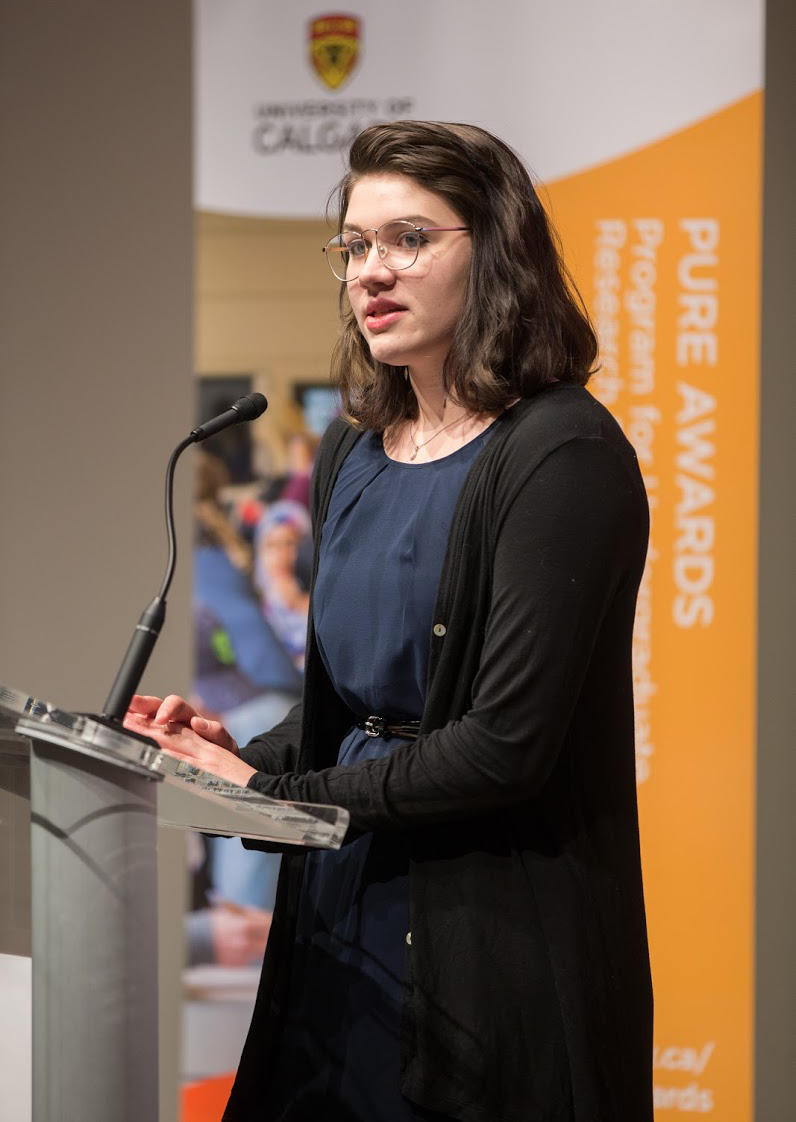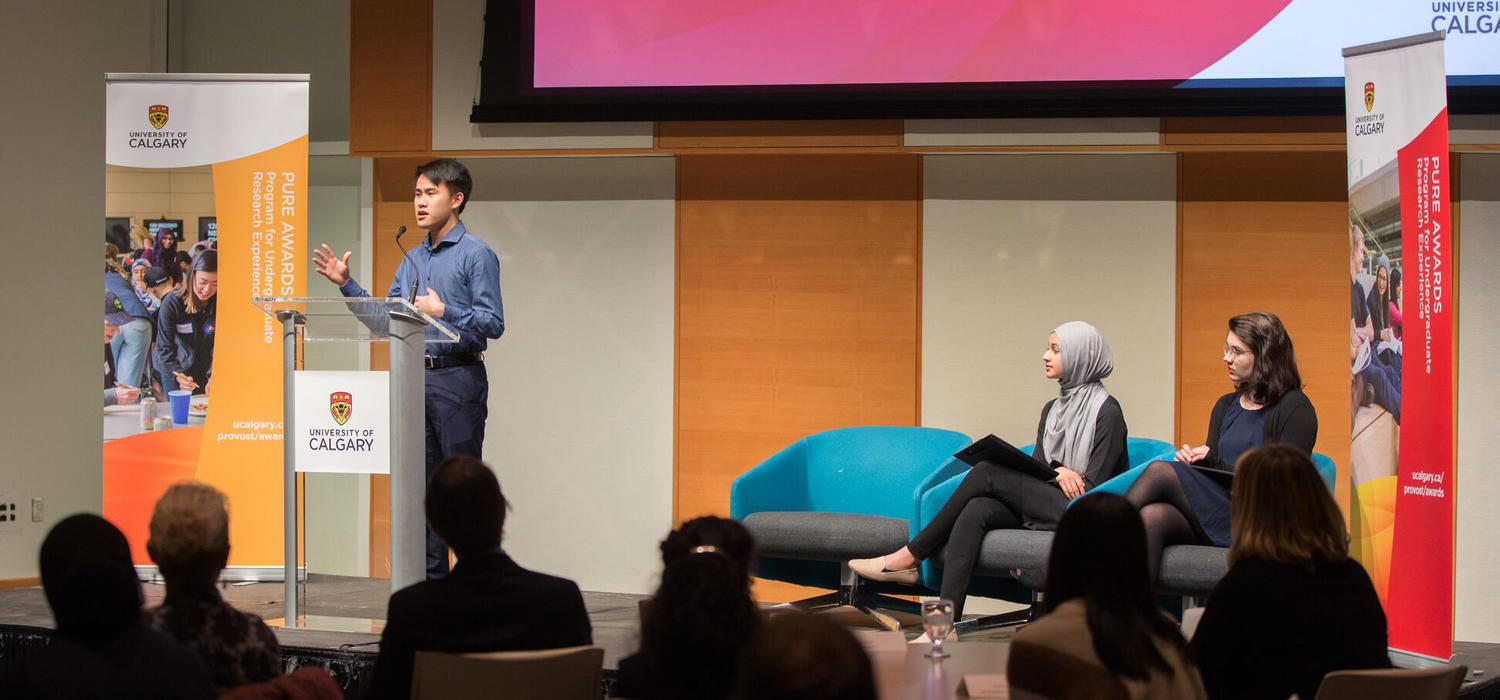
Emilie Medland-Marchen, an honours English student in the Faculty of Arts.
Adrian Shellard, for the University of Calgary
Oct. 24, 2018

Just as being a national speedskating competitor once pushed Emilie Medland-Marchen to test her limits, being paid to do her own research has changed her perspective as a Faculty of Arts student.
“I’ve personally learned a lot about myself,” she says, reflecting on her experiences last summer as a recipient of a Program for Undergraduate Research Experience (PURE) Award at the University of Calgary. “I think a lot of arts students have a tendency to shy away from this kind of funding because they have this idea that it normally goes to science students, or engineering or medical students, but I think it is really important to take on these research opportunities.”
Personal interests explored
Aimed at undergraduates across a wide range of disciplines, the annual program supported the research of 135 students in 2018 alone. They were honoured at the recent PURE Celebration of Achievement, which was hosted by the College of Discovery, Creativity and Innovation (CDCI) at the Taylor Institute for Teaching and Learning.
Successful applicants to the program get to conduct research between May and August on their own topics of interest, giving them the chance to learn under the supervision of some of the university’s top researchers. Awards range from $3,000 for eight weeks of research to $6,000 for 16 weeks, allowing recipients to concentrate full time on their work.
“Each PURE learning experience is a unique opportunity to develop research skills, but also to explore personal research interests, and develop abilities to collaborate, think critically and creatively, and communicate,” says AnneMarie Dorland, academic lead for the PURE Awards program.
An honours English undergraduate in the Faculty of Arts who is set to earn her degree this year, Medland-Marchen also trained up to six hours a day as a speedskater, earning a silver medal at the 2015 Canada Winter Games.
Although injuries forced her to retire from the sport, she brought that spirit of determination to her two months of research into goth youth subculture in Western Canada. “PURE gave me the economic ability to pretty much dive head-first into it,” she says.
“It became all-encompassing in my life and I was always thinking about it. Sometimes, I went on a tangent for weeks, but by being able to do the project over a couple of months, I was able to find that balance between breadth and focus. I learned a lot of skills in terms of things like research discipline.”

Emilie Medland-Marchen, an honours English student in the Faculty of Arts.
Adrian Shellard, for the University of Calgary
PURE inspires graduate studies
Medland-Marchen examined everything from literature to social media to determine the evolution of the goth subculture in cities such as Calgary, Edmonton, Regina, Saskatoon and Winnipeg. “The traditional depiction is of somebody who is wears all black, with black lipstick, pale skin and has a macabre attitude towards life, literature, music and fashion, but goths have become increasingly diverse, including people of colour and those who are marginalized,” she says.
“There are even pastel goths who wear pastel colours and are presented in a way that is inherently whimsical or feminine, but who still have the same sort of dread and cynicism toward society. Goths have also adapted to issues such as environmentalism and climate change.”
Due to her experiences under PURE, Medland-Marchen is considering continuing her education as a master's and PhD student. “I’m really interested in interdisciplinary research,” she says.
As a third-year undergraduate studying cellular, molecular and microbial biology in the Faculty of Science, Adley Mok used his PURE Award to research how a molecule called granzyme B can potentially help fight a particularly deadly form of fungal infection.
The molecule is involved in a key part of the human immune system called natural killer cells that help protect the body against invaders, including a type of fungus or yeast called Cryptococcus neoformans. The infection can attack the lungs and spread to the brain, causing diseases such as pneumonia and meningitis.
Student gets taste of future
Fungal infections can be hard to treat with conventional methods because drugs such as antibiotics are meant for bacterial infections, says Mok. He has empathy for such patients because he was frequently hospitalized as a child due to illnesses such as pneumonia.
“I had a weaker immune system, so for my research, I wanted to find out how to manipulate the immune system to treat diseases,” says Mok, who worked out of a lab in the Snyder Institute for Chronic Diseases at the Cumming School of Medicine. “PURE allowed me to do four months of full-time research, otherwise, I would have had to get a part-time job,” he says.
“You can use what you learned in class and apply it on the experimental level toward what your future career could be. It gives a pretty good glimpse into how actual researchers do their thing.”
Due to PURE, Mok is considering pursuing a graduate degree in immunology, possibly simultaneously studying to become a physician. “It would allow me to become a clinical scientist,” he says.
The PURE Awards are co-ordinated by the College of Discovery, Creativity and Innovation in the Taylor Institute for Teaching and Learning, and supported by the Office of Provost and Vice-President (Academic), the Office of the Vice-President (Research) and participating faculties.